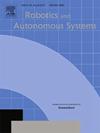Shape-Guided Detection: A joint network combining object detection and underwater image enhancement together
IF 4.3
2区 计算机科学
Q1 AUTOMATION & CONTROL SYSTEMS
引用次数: 0
Abstract
Most of the existing underwater image object detection methods involve pre-processing, such as using underwater image enhancement, to improve the accuracy of object detection. However, pre-processing methods are designed to improve the subjective perception of the human eye, which does not necessarily improve the object detection performance and consumes a large amount of computational resources. Therefore, in this paper, we creatively combine these two tasks and propose a Shape-Guided Detection network (SGD) to simultaneously optimize underwater image enhancement and object detection. In the SGD network, we innovatively incorporate the prior shape features as a learnable module embedded in it to fully explore the shape characteristics and structural details of the target object. To ensure that the prior knowledge can be effectively fused into the global network structure, we design a Shape Prior Enhancement module, which aims to realize the deep integration of the prior information with the local details. In order to optimize the stability of model training and enhance its convergence performance, a dual strategy of explicit and implicit constraints is ingeniously proposed in our method. We conduct extensive experiments on public datasets and the results show that the combination of our method with different detectors significantly improves the performance. The object detection performance reaches up to 0.491 mAP for optical images and 0.576 mAP for sonar images, and improves the preprocessing speed by 0.1 s.
形状引导检测:将物体检测和水下图像增强结合在一起的联合网络
现有的水下图像物体检测方法大多涉及预处理,如使用水下图像增强来提高物体检测的准确性。然而,预处理方法旨在改善人眼的主观感知,并不一定能提高物体检测性能,而且会消耗大量的计算资源。因此,在本文中,我们创造性地将这两项任务结合起来,提出了一种形状引导检测网络(SGD),以同时优化水下图像增强和物体检测。在 SGD 网络中,我们创新性地将先前的形状特征作为可学习模块嵌入其中,以充分探索目标物体的形状特征和结构细节。为确保先验知识能有效融合到全局网络结构中,我们设计了形状先验增强模块,旨在实现先验信息与局部细节的深度融合。为了优化模型训练的稳定性并提高其收敛性能,我们在方法中巧妙地提出了显式和隐式约束的双重策略。我们在公共数据集上进行了大量实验,结果表明,将我们的方法与不同的检测器相结合,可以显著提高性能。光学图像和声纳图像的物体检测性能分别达到了 0.491 mAP 和 0.576 mAP,预处理速度提高了 0.1 s。
本文章由计算机程序翻译,如有差异,请以英文原文为准。
求助全文
约1分钟内获得全文
求助全文
来源期刊

Robotics and Autonomous Systems
工程技术-机器人学
CiteScore
9.00
自引率
7.00%
发文量
164
审稿时长
4.5 months
期刊介绍:
Robotics and Autonomous Systems will carry articles describing fundamental developments in the field of robotics, with special emphasis on autonomous systems. An important goal of this journal is to extend the state of the art in both symbolic and sensory based robot control and learning in the context of autonomous systems.
Robotics and Autonomous Systems will carry articles on the theoretical, computational and experimental aspects of autonomous systems, or modules of such systems.
 求助内容:
求助内容: 应助结果提醒方式:
应助结果提醒方式:


